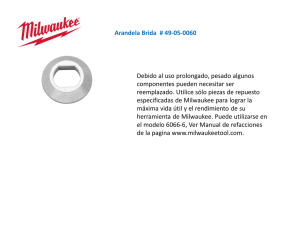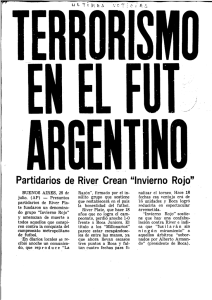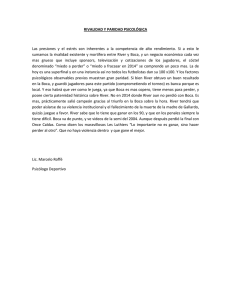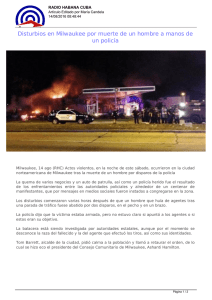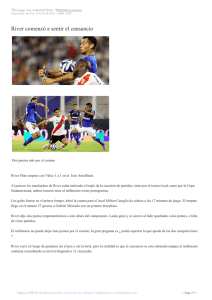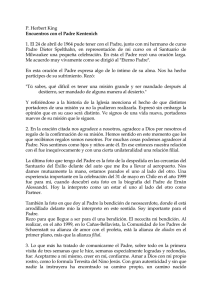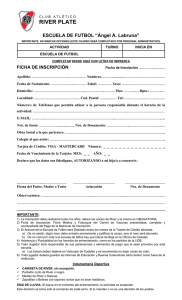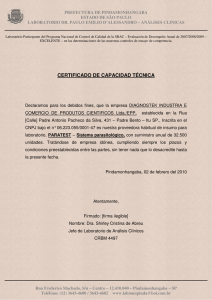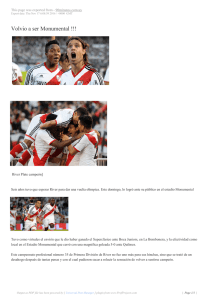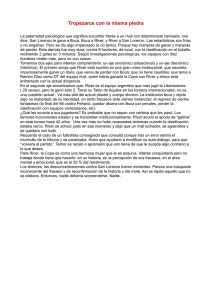KNOW YOUR FISH! - Ozaukee County
Anuncio
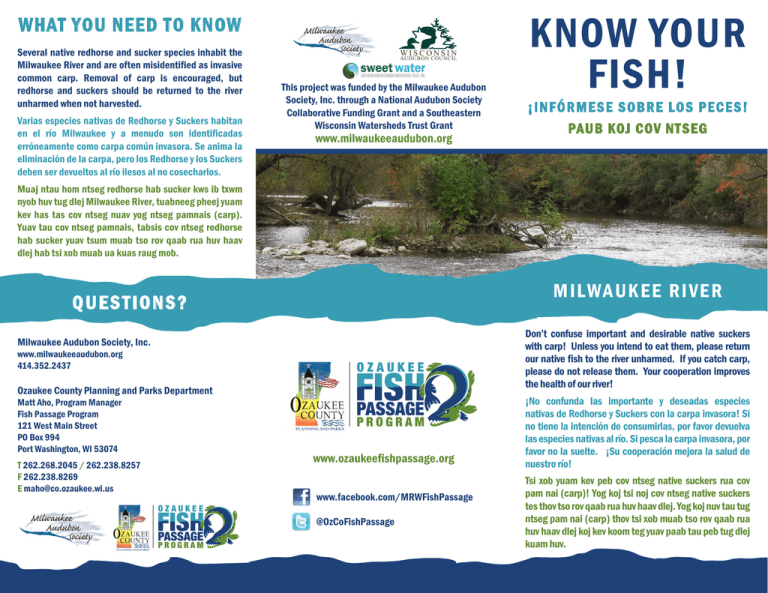
WHAT YOU NEED TO KNOW Several native redhorse and sucker species inhabit the Milwaukee River and are often misidentified as invasive common carp. Removal of carp is encouraged, but redhorse and suckers should be returned to the river unharmed when not harvested. Varias especies nativas de Redhorse y Suckers habitan en el río Milwaukee y a menudo son identificadas erróneamente como carpa común invasora. Se anima la eliminación de la carpa, pero los Redhorse y los Suckers deben ser devueltos al río ilesos al no cosecharlos. This project was funded by the Milwaukee Audubon Society, Inc. through a National Audubon Society Collaborative Funding Grant and a Southeastern Wisconsin Watersheds Trust Grant www.milwaukeeaudubon.org KNOW YOUR FISH! ¡Inf órm ese sobre l os peces! Paub koj cov ntseg Muaj ntau hom ntseg redhorse hab sucker kws ib txwm nyob huv tug dlej Milwaukee River, tuabneeg pheej yuam kev has tas cov ntseg nuav yog ntseg pamnais (carp). Yuav tau cov ntseg pamnais, tabsis cov ntseg redhorse hab sucker yuav tsum muab tso rov qaab rua huv haav dlej hab tsi xob muab ua kuas raug mob. MILWAUKEE RIV ER Q U E S TI O N S ? Don’t confuse important and desirable native suckers with carp! Unless you intend to eat them, please return our native fish to the river unharmed. If you catch carp, please do not release them. Your cooperation improves the health of our river! Milwaukee Audubon Society, Inc. www.milwaukeeaudubon.org 414.352.2437 Ozaukee County Planning and Parks Department Matt Aho, Program Manager Fish Passage Program 121 West Main Street PO Box 994 Port Washington, WI 53074 T 262.268.2045 / 262.238.8257 F 262.238.8269 E [email protected] www.ozaukeefishpassage.org www.facebook.com/MRWFishPassage @OzCoFishPassage ¡No confunda las importante y deseadas especies nativas de Redhorse y Suckers con la carpa invasora! Si no tiene la intención de consumirlas, por favor devuelva las especies nativas al río. Si pesca la carpa invasora, por favor no la suelte. ¡Su cooperación mejora la salud de nuestro río! Tsi xob yuam kev peb cov ntseg native suckers rua cov pam nai (carp)! Yog koj tsi noj cov ntseg native suckers tes thov tso rov qaab rua huv haav dlej. Yog koj nuv tau tug ntseg pam nai (carp) thov tsi xob muab tso rov qaab rua huv haav dlej koj kev koom teg yuav paab tau peb tug dlej kuam huv. REDH O R S E /S UC KE RS Redhorse and suckers (including the threatened greater redhorse) are often caught in the Milwaukee River. A menudo se pescan los Redhorse y los Suckers (incluyendo la amenazada Greater Redhorse) en el Río Milwaukee. Cov ntseg redhorse hab sucker (nrug rua cov ntseg Greater Redhorse kws muaj tsawg lawm) pheej muab tau nyob huv tug dlej Milwaukee River. COMMO N C A R P Eat or Return to River / Consuma o Devuelva al Rio / Noj los sis tso rov qaab rua hub haav dlej Downward-pointing mouth for feeding from the river bottom. Boca que apunta hacia abajo para alimentarse del fondo del río. Lub qhov ncauj pau rua saab huv, txhaj le noj tau khoom noj nyob huv qaab thu dlej. Soft top fin with 10-17 rays. Aleta dorsal blanda que tiene 10-17 rayos. Dlaim tis nraus qaum muas-muas hab muaj le 10-17 tug pob txhaa mog. Eat or Do Not Return to River / Consuma o No Devuelva al Rio / Noj los sis tsi txhob tso rov qaab rua hub haav dlej Common carp are harmful, invasive fish in the Milwaukee River. They damage the river and removing them is encouraged. La carpa común es un pez dañino e invasor en el Río Milwaukee. Hacen daño al río y su eliminación se anima. Cov ntseg pamnais (carp) yog yaam ntseg tsi zoo nyob rua huv tug dlej Milwaukee River. Nwg ua rua tug dlej tsi zoo tuaj. Leej twg yuav yuav cov ntseg pamnais nuav los tau. Two pairs of “whiskers” at each corner of a forwardpointing mouth. Dos pares de bigotes en cada esquina de la boca que apunta hacia delante. Muaj ob khub fwj txwv (whiskers) nyob ntawm kaum ncauj. Hard, serrated spine on the front of the top fin. Una espina dura y serrada en la frente de la aleta dorsal. Dlaim tis nraus qaum muaj ib tug muv tawv-tawv nyob tom hauv ntej. *Images courtesy of John Lyons, WI Department of Natural Resources
